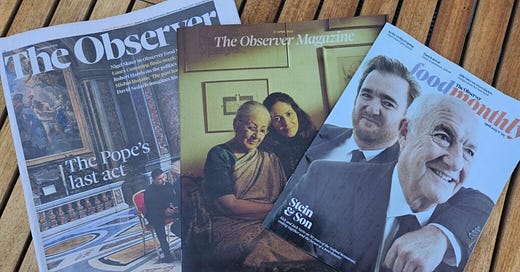Observer relaunches under Tortoise | Facebook 'journalist' ad scams spread
Plus we have your news diary for the week ahead and PA Media names new CTO
Good morning and welcome to your daily Press Gazette news briefing on Monday 28 April, brought to you today in association with Sophi, Mather’s AI-powered revenue optimization suite.
Dynamic paywalls remain a hot topic in publishing, and knowing how to use them strategically can be a powerful driver of revenue growth. In today’s feature, Mather explores how publishers are evolving their approach to find the right balance between user privacy, reader engagement, and subscription growth.
The Observer got off to a sure-footed start with its first print edition under Tortoise ownership yesterday.
If anything the print edition felt beefier than before and new editor-in-chief James Harding will have salved some concerns about its future direction with an editorial vowing to safeguard its 233-year-old tradition of independence and liberalism.
The sustainability of The Observer depends on finding new revenue streams beyond the print edition with online subscriptions the most likely source of funding.
The Observer website starts from zero (readers as well as subscribers) so it has a mountain to climb and must compete against a vastly better-resourced and free rival in the form of its ex-stablemate The Guardian.
Today we return to the subject of scam Facebook adverts featuring journalists and other high-profile figures which have proliferated and become more sophisticated since they were first highlighted by Press Gazette a month ago.
The FT's Martin Wolf has revealed that since he first complained about a scam investment advert on Facebook which stole his name and likeness the site has become even more widespread and been viewed at least one million times.
This is fairly tame stuff for a company which has previously boasted to advertisers about how it can market to anxious teenagers and which stands accused of complicity in genocide in Myanmar through its negligence.
But it will be intriguing to see whether Ofcom gets involved in what seems like a clear breach of the new UK Online Safety Act.
Facebook makes billions from advertising in the UK, taking money which previously supported journalism and the business of verification. Whereas newspapers and news websites are responsible for the advertising and editorial content they publish, Facebook has so far been largely immune from prosecution - enabling it to replace old media with its grounding in legality and reality.
Any other business would probably do a quick check to see if adverts promoting financial investment schemes were legal before sticking them live, but for Meta this appears to be a bridge too far.
Your news diary for the week ahead includes a first appearance in court for Russell Brand on charges of rape on Friday in a case which follows an investigation by The Times, Sunday Times and Channel 4 Dispatches.
From our sponsor
Sophi, developed in the newsroom of The Globe and Mail and now trusted by 300+ news sites, is celebrating 10 years of helping publishers grow revenue with smarter, AI-powered decisions.
📈 Case Study: The Philadelphia Inquirer
When static rules and manual paywall tweaks began limiting subscription growth, The Inquirer turned to Sophi’s AI-powered Dynamic Paywall Engine to automate decisions and strike a better balance between engagement, ad revenue, and conversions.
The results?
✅ 35% increase in direct paywall subscriptions
✅ 13% lift in overall conversions
✅ Reader engagement maintained
With AI optimizing every decision, The Inquirer exceeded its 2024 subscriber goals, despite industry challenges.
On Press Gazette
‘The opposite of what Hitler would do’ on better paper: Observer relaunched by Tortoise
The title announced the launch of a bookshop in its first edition (something former owner The Guardian also runs). Harding said that ObserverTV, more podcasts alongside the existing Tortoise roster, an Observer app and live events are planned.
Facebook allows scam ads stealing journalists’ identities to proliferate
The UK Online Safety Act is supposed to protect user of social platforms against fraud and is enforced by Ofcom. The FT has raised the issue with the UK Government but was merely directed towards Meta advertising policies which purport to prohibit such misleading activity.
News diary 28 April – 4 May: UK local elections, first Russell Brand court hearing
A look ahead at the key events leading the news agenda this week, from the team at Foresight News.
News in brief
Global chief technology and product officer David Henderson is moving to PA Media Group as chief technology officer. (Press Gazette)
Los Angeles-based business media brand Marketplace is cutting seven roles but investing in "several new roles and workflows to usher in our digital transformation". (Press Gazette)
Emma Callaghan, who was named Reach interim chief revenue officer when Piers North was promoted to chief executive a month ago, has been appointed on a permanent basis to lead the commercial team "as we continue to build a stronger and more diverse revenue mix". (Press Gazette)
Ex-PM Gordon Brown says he has made a criminal complaint to the Metropolitan Police about Sun and formerly News of the World publisher News Group Newspapers regarding alleged obstruction of justice. NGN denies email deletion to conceal evidence. (The Guardian)
US private equity firm Redbird Capital is moving ahead with a plan to either form a consortium or self-fund a deal for The Telegraph without IMI's UAE funding which caused its takeover to be blocked last year putting the publisher back up for sale. (The Guardian)
The US Department of Justice has rescinded a Biden administration policy that prevented prosecutors looking into leaks from seizing reporters' records in most circumstances. Effective immediately, prosecutors investigating leaks may now subpoena journalists' records and testimony. (Reuters)
Also on Press Gazette
Who’s suing AI and who’s signing: Ziff Davis sues OpenAI after Washington Post signs deal
Google scraps plans for alternative Sandbox ad-targeting technology
EU’s €500m fine of Apple and enforcement action is good news for publishers
Grand Designs and Good Homes magazines end print publication
Tortoise plans for The Observer: ‘We can buck the market trend’
Politico Europe reports ‘significant growth’ as its team reaches 350 people
How Mail has gained thousands of subscribers for crime podcasts
Latest podcast: Making political news pay the Politico way
Press Gazette senior reporter Bron Maher talks to Politico executive editor for Europe Kate Day about the niche brand's rapid expansion on this side of the Atlantic.
The title launched in Washington in 2007 and has been in Europe since 2015. It now has 350 staff in Europe with 45 journalists in the UK alone. Day explained how the brand's mixed B2B and consumer business model works and revealed more about its further expansion plans.







